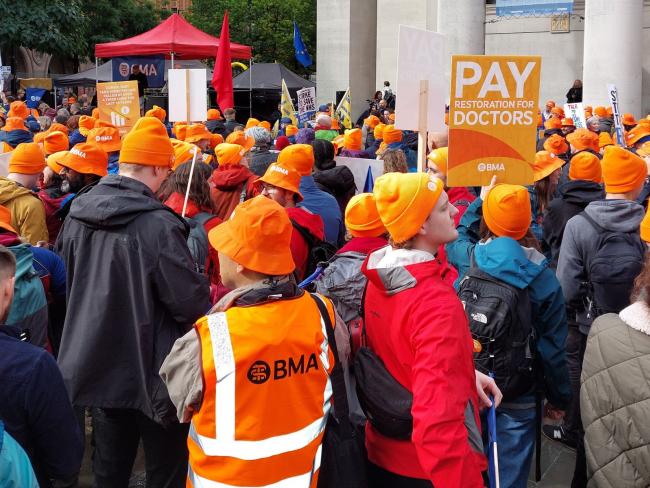14 July 2025

It’s a long term struggle. Resident doctors lobbying for pay restoration at the Conservative Party conference, Manchester, October 2023. Photo Workers.
Doctors face many challenges, not least on pay levels for their highly skilled profession. After a lengthy dispute last year, resident doctors (doctors in training) are again considering taking strike action. But this is not straightforward and they cannot rely on the support from the public and their NHS colleagues they generally had last year.
Resident doctor members of the British Medical Association (BMA) will strike for five days from 25 to 30 July as part of their continuing campaign for pay restoration. The mandatory ballot for action returned 90 per cent in support, on a turnout of 55 per cent.
Turnout down
Turnout this time was well down on previous strike ballots: 77 per cent in February 2023; 71 per cent in August 2023; and 62 per cent in March 2024. The minimum turnout for a valid strike vote under trade union legislation is 50 per cent.
The ballot took place in response to a recommendation from the Review Body on Doctors’ and Dentists’ Remuneration of a 4 per cent increase plus a consolidated uplift of £750. The BMA’s figures show that an increase of 29 per cent, 25 per cent over and above the review body’s award, is needed to reverse the erosion of pay since 2008-09. In 2024 resident doctors achieved a substantial increase after eleven rounds of industrial action.
Professionalism
As well as fighting against the erosion of pay, the BMA has campaigned against attacks on professionalism including the creeping use of physician associates as doctor-substitutes, The Leng Review on physician and anaesthesia associates is expected to report on Wednesday 16 July.
The 2024 report by the General Medical Council on the medical education workforce found an increase in the use of international medical graduates. Over two-thirds of those joining the medical workforces in 2023 were non-UK graduates. These non-UK graduates are reportedly less likely to join strikes.
Priority
In the recent NHS Long Term Plan, the BMA was able to achieve priority for UK medical school graduates over international graduates in selection for foundation and speciality training. Whatever the overall shortcomings of the plan, that’s a significant step. But there’s still work to do to ensure there are jobs for newly-qualified doctors.
‘Doctors will require high levels of strategic and tactical thinking.’
Dealing with their employer, the government, will require resident doctors to exercise high levels of strategic and tactical thinking. Otherwise they will fail to make more progress towards the twin goals of pay restoration and the defence of skill.
An approach demanding 29 per cent now or bust lacks the clarity, consistency and patience that a protracted struggle requires, as well as ignoring the risks to the service as a whole and the impact on other NHS colleagues.
Weaker support
In previous rounds of action, resident doctors were able to bring the public with them. There are signs that public support may be weaker this time. That does not mean abandoning the pay struggle, but should be a factor in shaping tactics. The government will be delighted if it can frame doctors as careless of the needs of the patients under their care.
In past rounds of action, some doctors weakened the effect of strikes by striking and then taking lucrative locum posts at other hospitals on strike days. They saw nothing wrong with this: other workers may have a different view.
Lessons
There are intrinsic challenges in organising resident doctors. The nature of progress during doctors’ extended training means that lessons, positive and negative, can easily be forgotten.
The composition of this group changes annually as they progress through training. And they move regularly from workplace to workplace. Those who were in training posts in the years that doctors’ pay was allowed to decline have moved on and are now consultants or GP partners.
